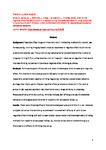Brief online negative affect focused functional imagery training improves two-week drinking outcomes in hazardous student drinkers: a pilot randomised controlled trial
| dc.contributor.author | Shuai, R | |
| dc.contributor.author | Bakou, AE | |
| dc.contributor.author | Andrade, Jackie | |
| dc.contributor.author | Hides, L | |
| dc.contributor.author | Hogarth, L | |
| dc.date.accessioned | 2021-08-12T12:01:13Z | |
| dc.date.issued | 2021-08-25 | |
| dc.identifier.issn | 1070-5503 | |
| dc.identifier.issn | 1532-7558 | |
| dc.identifier.uri | http://hdl.handle.net/10026.1/17564 | |
| dc.description.abstract |
<jats:title>Abstract</jats:title><jats:sec> <jats:title>Background</jats:title> <jats:p>Negative affect plays an important role in motivating problematic alcohol use. Consequently, training imagery-based adaptive responses to negative affect could reduce problematic alcohol use. The current study tested whether personalised online functional imagery training (FIT) to utilise positive mental imagery in response to negative affect would improve drinking outcomes in hazardous negative affect drinking students.</jats:p> </jats:sec><jats:sec> <jats:title>Method</jats:title> <jats:p>Participants were 52 hazardous student drinkers who drink to cope with negative affect. Participants in the active group (<jats:italic>n</jats:italic> = 24) were trained online over 2 weeks to respond to personalised negative drinking triggers by retrieving a personalised adaptive strategy they might use to mitigate negative affect, whereas participants in the control group (<jats:italic>n</jats:italic> = 28) received standard risk information about binge drinking at university. Measures of daily drinking quantity, drinking motives, self-efficacy and use of protective behavioural strategies were obtained at baseline and 2 weeks follow-up.</jats:p> </jats:sec><jats:sec> <jats:title>Results</jats:title> <jats:p>There were three significant interactions between group and time in a per-protocol analysis: the active intervention group showed increased self-efficacy of control over negative affect drinking and control over alcohol consumption and decreased social drinking motives from baseline to 2-week follow-up, relative to the control intervention group. There were no effects on drinking frequency.</jats:p> </jats:sec><jats:sec> <jats:title>Conclusion</jats:title> <jats:p>These findings provide initial evidence that online training to respond to negative affect drinking triggers by retrieving mental imagery of adaptive strategies can improve drinking-related outcomes in hazardous, student, negative affect drinkers. The findings support the utility of FIT interventions for substance use.</jats:p> </jats:sec> | |
| dc.format.extent | 346-356 | |
| dc.format.medium | Print-Electronic | |
| dc.language | en | |
| dc.language.iso | en | |
| dc.publisher | Springer Verlag | |
| dc.subject | Pilot randomised controlled trial | |
| dc.subject | Emotion regulation | |
| dc.subject | Guided imagery | |
| dc.subject | Negative affect drinking | |
| dc.title | Brief online negative affect focused functional imagery training improves two-week drinking outcomes in hazardous student drinkers: a pilot randomised controlled trial | |
| dc.type | journal-article | |
| dc.type | Journal Article | |
| dc.type | Randomized Controlled Trial | |
| plymouth.author-url | https://www.webofscience.com/api/gateway?GWVersion=2&SrcApp=PARTNER_APP&SrcAuth=LinksAMR&KeyUT=WOS:000688365800001&DestLinkType=FullRecord&DestApp=ALL_WOS&UsrCustomerID=11bb513d99f797142bcfeffcc58ea008 | |
| plymouth.issue | 3 | |
| plymouth.volume | 29 | |
| plymouth.publication-status | Published | |
| plymouth.journal | International Journal of Behavioral Medicine | |
| dc.identifier.doi | 10.1007/s12529-021-10019-9 | |
| plymouth.organisational-group | /Plymouth | |
| plymouth.organisational-group | /Plymouth/Admin Group - REF | |
| plymouth.organisational-group | /Plymouth/Admin Group - REF/REF Admin Group - FoH | |
| plymouth.organisational-group | /Plymouth/Faculty of Health | |
| plymouth.organisational-group | /Plymouth/Faculty of Health/School of Psychology | |
| plymouth.organisational-group | /Plymouth/REF 2021 Researchers by UoA | |
| plymouth.organisational-group | /Plymouth/REF 2021 Researchers by UoA/UoA04 Psychology, Psychiatry and Neuroscience | |
| plymouth.organisational-group | /Plymouth/REF 2021 Researchers by UoA/UoA04 Psychology, Psychiatry and Neuroscience/UoA04 REF peer reviewers | |
| plymouth.organisational-group | /Plymouth/Research Groups | |
| plymouth.organisational-group | /Plymouth/Research Groups/Centre for Brain, Cognition and Behaviour (CBCB) | |
| plymouth.organisational-group | /Plymouth/Research Groups/Centre for Brain, Cognition and Behaviour (CBCB)/Cognition | |
| plymouth.organisational-group | /Plymouth/Research Groups/Institute of Health and Community | |
| plymouth.organisational-group | /Plymouth/Research Groups/Plymouth Institute of Health and Care Research (PIHR) | |
| plymouth.organisational-group | /Plymouth/Users by role | |
| plymouth.organisational-group | /Plymouth/Users by role/Academics | |
| dc.publisher.place | England | |
| dcterms.dateAccepted | 2021-08-11 | |
| dc.rights.embargodate | 2021-8-27 | |
| dc.identifier.eissn | 1532-7558 | |
| dc.rights.embargoperiod | Not known | |
| rioxxterms.versionofrecord | 10.1007/s12529-021-10019-9 | |
| rioxxterms.licenseref.uri | http://www.rioxx.net/licenses/all-rights-reserved | |
| rioxxterms.licenseref.startdate | 2021-08-25 | |
| rioxxterms.type | Journal Article/Review |


